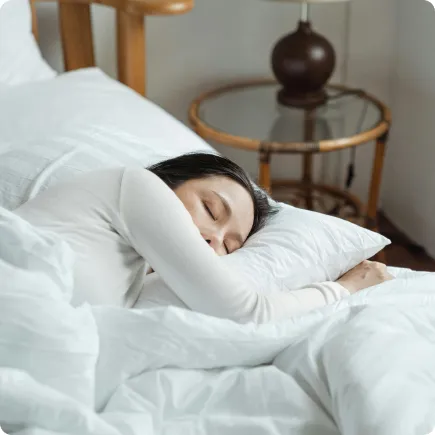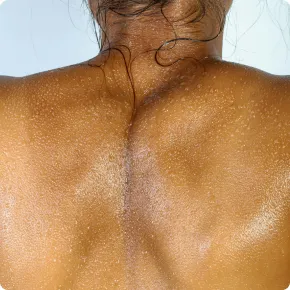
Unique Menopause Symptoms to Watch Out For

Hot flashes, insomnia, and depression are almost synonymous with menopause. But for many people, they’re just the tip of the iceberg. Menopause causes major hormone shifts that impact virtually every part of your body, yielding a huge range of symptoms. Some of them are so unique that you might not even associate them with menopause. That includes changes in body odor, odd skin sensations, asthma attacks, and more.
In this piece, we’ll explore some other menopausal symptoms, why they may occur, and what you can do about them. But first, let’s review the most common symptoms and learn how they’re triggered by changes in your underlying hormone balance.
Common Symptoms of Menopause
Before gaining an understanding of the unusual symptoms that may occur during the menopause transition, it’s good practice to reacquaint yourself with the more common symptoms that occur during this stage of life. These symptoms include:
- Hot Flashes
- Mood Changes
- Vaginal Dryness
- Insomnia
- Fatigue
- Headaches
- Brain Fog
- Changes in Body Shape
of Members report symptom improvement within 3 months.
care at your fingertips.

Unique Menopause Symptoms
Dry Skin & Hair
During your reproductive years, estrogen stimulates your skin’s production of oils (which help it retain moisture) and collagen (which gives your skin structure). Falling estrogen levels can therefore cause changes in your skin’s texture and appearance. Your skin may become drier and thinner while losing elasticity and gaining some fine lines and wrinkles. Your hair may also become drier due to the lack of oils.
Fortunately, these changes can usually be addressed with some lifestyle tweaks and a smart approach to daily skincare. Talk to your dermatologist and get their recommendation on the best daily cleansers and moisturizers for dry skin. You may want to ask about moisturizers containing hyaluronic acid or glycerin, which are recommended by the American Academy of Dermatology. And for fine lines and wrinkles, ask your dermatologist about tretinoin—a prescription anti-aging treatment. For dry hair, a moisturizing shampoo and weekly hair mask can work wonders.
Frequent Urination
The muscles of your pelvic floor support your bladder. During menopause, these muscles can become weaker, leading to a range of issues including a frequent need to urinate and urinary leakage.
If you’re struggling with these symptoms, your doctor might recommend kegel exercises. Kegels are a way to flex and strengthen your pelvic muscles, and some research suggests they can help improve bladder control. There are also some pharmacological treatments that can help, including a class of drugs called antimuscarinics (such as oxybutynin and tolterodine). Antimuscarinics seem to relax your bladder (allowing it to hold more urine) while strengthening the muscles that support it.
Body Odor Changes
As you enter the menopause transition, you may find that your natural eau de parfum has become a little more pungent—or that you simply smell different than you used to. This may be due to relative increases in hormones like testosterone and cortisol, which are linked to stronger body odor. It may also result from hot flashes, which cause you to sweat more, thus feeding your underarm skin microbiome.
Dealing with menopausal body odor generally involves the same common-sense strategies you’ve used throughout your life—i.e. washing frequently and finding a deodorant or antiperspirant that works for you. You might also need to optimize your diet to remove foods that make your sweat more pungent (such as garlic and onions) and to hydrate more to replace the fluids you lose during hot flashes. Read our full post on menopause and body odor.
Aches & Pains
Estrogen helps strengthen and maintain the intricate tissues of your joints, such as the cartilage, tendons, and synovium. Falling estrogen levels can thus coincide with creaky joints that are more prone to inflammation and irritation. Lower estrogen may also make you more sensitive to pain, which can amplify commonplace aches even if the condition of your joints hasn’t changed.
Low-impact exercise is a powerful and holistically healthy way to ease joint pain. If you’re not working out already, give yoga or swimming a shot. Recent research has suggested that Menopausal Hormone Therapy (MHT) may ease menopausal joint pain as well. This is no surprise, as MHT addresses estrogen withdrawal—a potential root cause of joint pain and countless other menopause symptoms. Over-the-counter painkillers (such as NSAIDs like ibuprofen) can also be helpful, as can anti-inflammatory foods and stress-reduction techniques. For more tips, check out our full post on joint pain during menopause.
Tinnitus
Although it hasn’t yet been studied extensively, there have long been anecdotal reports linking menopause with tinnitus (i.e. the sensation of ringing in your ears). Tinnitus can be incredibly distressing if it persists and may lead to chronic stress and depression. A small 2018 study found that people who supported their natural estrogen levels during menopause with hormone therapy were significantly less likely to develop tinnitus, suggesting that there are real hormonal factors at work.
Fortunately, most tinnitus cases resolve on their own within several months. In the meantime, a white noise machine or some relaxing background music can help mask the ringing sensation. Some people also find that limiting stimulants (such as caffeine) and de-stressing activities like yoga are helpful.
Digestive Issues
Indigestion, diarrhea, constipation, gas, and bloating are all fairly common during the menopause transition. There are probably several mechanisms underlying this relationship. The first is estrogen, which has complex effects on gut motility (i.e. the movement of food through your stomach and intestines). Falling estrogen can thus cause food to move too slowly or too quickly through your digestive tract, which may trigger some of the symptoms above. Second, menopause can affect the gut microbiome. A number of studies have shown that the hormonal changes that occur during menopause can alter the composition and diversity of the gut microbiome, which can lead to digestive issues. Lastly, falling estrogen raises your cortisol levels, which can also cause digestive issues.
The right treatment for your digestive issues will depend on exactly which symptoms you’re experiencing. Your healthcare provider can help you find a strategy that combines lifestyle changes (such as increased fiber and water content to treat constipation and removing foods that cause gas) with proven over-the-counter treatments or prescription medications. Herbal remedies (such as ginger and peppermint tea) may also help ease some stomach distress.
Dizziness
Many people find themselves feeling suddenly dizzy or lightheaded during the menopause transition. Researchers haven’t been able to identify exactly why this happens. It may be the result of low blood sugar (caused by hormonal changes in digestion), perhaps worsened by dehydration (which can result from sweating and fluid loss during hot flashes). There’s also evidence that estrogen can interact directly with your inner ear, which could cause feelings of vertigo. Some women in perimenopause find that their vertigo corresponds to their period and could be a sign of vestibular migraines.
For most people, this issue is fairly benign and doesn’t cause any major problems. In the meantime, drinking more water and eating small snacks to stabilize your blood sugar level may help reduce dizziness. It can also be helpful to avoid excessive intake of caffeine and alcohol. A small study has also shown that ginger (a traditional nausea remedy) can ease symptoms of vertigo.
Brittle Nails
Your fingernails and toenails are made of a protein called keratin. When your estrogen level drops, it can disrupt the way your body builds keratin, causing your nails to become more fragile. This can lead to more frequent chipping and splitting in your nails. For most people, it’s fairly easy to treat this symptom with a nail bed moisturizer and some strengthening lacquer.
Worsening Asthma
For people already diagnosed with asthma, menopause can cause a significant increase in the rate of daily asthma attacks. (It’s also possible to develop newly-diagnosed asthma during menopause, though the risk is no greater than any other phase of life.) Researchers aren’t exactly certain why this happens, but it’s believed that estrogen protects the health of the lung tissue. This would explain why menopausal hormone therapy has been linked to fewer asthma attacks and improved lung functioning generally.
If you’re noticing more asthma attacks, it’s important to work carefully with your doctor or pulmonologist to find the right approach. You may need to update your medication type or dosage. You can also ask about whether menopausal hormone therapy may be right for you.
Dry Eyes
Everyone experiences dry eyes from time to time, but chronically dry eyes can cause pain and serious complications for your vision. This condition becomes significantly more common during the menopause transition and beyond. The underlying mechanism is complex, but it seems to relate to your balance of sex hormones (both estrogen and testosterone) and how they influence your formation of tears.
There are a number of medications available that can treat chronically dry eyes. That includes as-needed over-the-counter eye drops like Visine. It also includes prescription drugs like cyclosporine and lifitegrast (which can reduce inflammation that dries out your eyes), as well varenicline—a nasal spray that increases tear production.
The Bottom Line
Everyone’s experience of menopause is unique. Symptoms that are mild or nonexistent for you may be very uncomfortable for the next person, and vice versa. So try to drop any notion of what your menopause experience “should” look like. Whatever your symptoms, large or small, they deserve the full attention and care of your doctor. Talk with your healthcare provider and find out what’s causing your symptoms and how best to treat them. With some small lifestyle adjustments and an evidence-based treatment plan, you’ll be able to thrive during this new chapter of your life.
of Members report symptom improvement within 3 months.
care at your fingertips.

of Members report symptom improvement within 3 months.
care at your fingertips.

References



